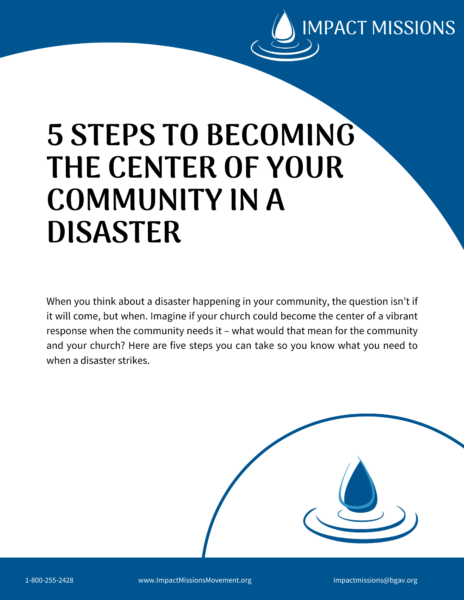When you think about a disaster happening in your community, the question isn’t if it will come, but when. There will be a thousand ways to respond, but if you face the situation without a plan, you might contribute to the problem instead of being part of the solution. Imagine if your church could become the center of a vibrant response when the community needs it – what would that mean for the community and for your church?
Know your story
One of the best predictors of how your community will respond to a disaster is what happened during the last one. Every community has stories of tragedy that have become a part of their identity, and those events and how people responded to them can be excellent lessons for how to respond in the future. Take time to explore with your church who was the most helpful and what they would do differently if it happened again. Previous crises where they feel like they missed an opportunity or responded particularly well will give key insights into where they might be motivated to make changes for the future.
Know your resources
When a disaster strikes, people instinctively want to donate – it’s a quick way to feel like we’re doing something. But the resources we offer aren’t always the ones people need. When the daily temperature in the affected area is over 90 degrees, and volunteers find themselves sorting through winter coats people donated, it’s clear “just doing something” isn’t the best option. In the absence of a plan, people will send what they can lay hands on quickly, even if those items aren’t useful.
We do have valuable resources to offer. When the disaster strikes at home, it may be that our “stuff” isn’t nearly as helpful as our space – a building might be an excellent shelter, a kitchen might provide meals, or a parking lot might serve as a distribution site. The best way to offer the right resources when a disaster strikes is to decide what to offer before it happens.
Know your neighbors
A disaster serves as a reminder that certain people in the community are especially vulnerable. Whether those are people in your church or neighbors in the wider community, they’re the people who will need help first. They’re also likely the people who may be least able to ask for it. Having a relationship with them beforehand means they’ll trust you to respond in the moment.
Know your assets
Knowing the needs can only get you so far; you can respond best by knowing what your best options are. When a church thinks of its assets, the first asset people usually name is the building – and your space may be a gift to the community in a crisis. But even a new building isn’t all that useful without your church’s actual greatest asset: your people.
Right now there are people in your church who have amazing skills that might be exactly what you’d need in a disaster, but because they don’t stand out as public speakers or teachers, they’ve flown under the radar. You likely know the gifts people have that help you in ordinary church life, but really knowing your people and what they can do will help discern what you can do when the extraordinary happens. These people, with amazing skills that would turn your church into the center of the community’s response, think those very skills aren’t the kind of thing the church can use. Get to know them and help them see how truly valuable they can be when the church and community need them most.
Know your partners
When the community suffers a disaster, the last thing responders have time for is calling people to ask if they will help. Most communities have a response plan in place, and no matter how well prepared you are, if they don’t already know you, they won’t call you. They go to the people and organizations they already know, because they know what they can do. If your church wants to be your community’s go-to when a disaster strikes, you need to have those relationships in place before the disaster. Whether it’s the community’s emergency management team, first responders, schools, or social services, cultivating a relationship of support and respect when things are going well will pay dividends for your church and the community when the disaster strikes. And taking the lead when the disaster strikes will create opportunities for ministry that live far beyond the disaster.
Getting the skills you need
Taking these steps will position your church well for when your community is in crisis. Use this checklist with your church to start developing your plan now. Once you have a plan, the next step is to train specifically for your response. Disaster response training for individuals or for church teams is a great way to connect to people who have been there and done this before, serve with them in your community and in others where disasters strike, and thrive as you continue to invest in your people and the communities that need your help and need to know the God who calls us and loves us. You can develop a team that’s ready to respond, and you can explore how those principles can help your church minister more effectively even when the skies are blue. And when the disaster strikes, you’ll have people from all over ready to support you as you serve.
Learn more in the resource below:
Disaster Response mobilizes volunteers to provide high-quality services to meet human needs after a disaster. When a disaster strikes a community, we all want to do something. But during a disaster, how you help is as important as being willing to help. With our training, partnerships, and experience behind you, you and your church can help people facing all the challenges brought by a storm. Learn more here.

